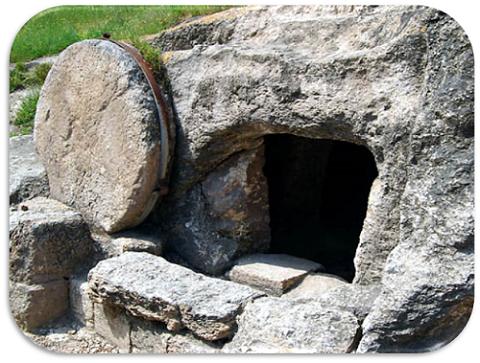According to the Scriptures
According to the Scriptures

We have just celebrated Easter, the feast of the great and unimaginable event of our Saviour’s resurrection from the dead. This fact makes us look forward to a great future. “We look forward to the resurrection of the dead and the life of the world to come.” That is how the church has expressed it in the Nicene Creed. Is this expectation well founded? What we are hoping for is completely rejected by countless people. Who says that what the Bible says is true? The Bible plays a major role in our expectation. The same creed of Nicaea states that Christ’s resurrection was “according to the Scriptures.” The resurrection of the Lord not only creates expectation for our future. It also says something about the basis of our hope.
Is It Really True?⤒🔗
I am not sure if other colleagues experience the same thing, but it strikes me that, in my catechism classes, the question of whether the Bible is really true is asked more and more. How can you know that what the Bible says is reliable? I have the impression that such questions are asked more often today than about ten or fifteen years ago.
That is undoubtedly due to the inter-religious climate that governs our society. Many religions are opposed to each other, the one somewhat less tolerant, another somewhat more. But even the most tolerant conviction, namely, that each person is welcome to his own beliefs, is still claiming that this very conviction is the real truth. Such a climate in itself already challenges the truth of the gospel.
In this atmosphere it is no wonder that a book such as The Da Vinci Code, which represents the Christian faith as a counterfeit, has become a bestseller. And the fact that the discovery of a so-called letter from Jude has been magnified as a formidable find, also fits into this atmosphere. Is the Bible really true?
There is also another influence on our current climate. Charismatic thought charms many people. People look for the miracles of the Spirit in our present time. What did the church do with tongues, prayer healings, prophecies, and other promptings that the Spirit still wishes to give? When the truth and the reliability of the Bible are disputed, this so-called renewal can easily turn into a new anchor: the truth of the gospel should now be proved by miracles and revelations of the Spirit in our day and age.
The Nicene Creed←⤒🔗
The Nicene Creed dates, as is well known, from AD 325. That is around the time when, according to The Da Vinci Code, the forgery that shaped Christianity began. Yet when this creed says that Christ has risen “according to the Scriptures,” it is difficult to regard it as a forgery.

The agreement between our creed and Paul’s words in 1 Corinthians 15 is clear. In the church of Corinth—even back then; we are not dealing with anything new today!—the error was propagated that there was no resurrection of the dead. To refute this error, the apostle writes the comprehensive and beautiful fifteenth chapter of his letter about the resurrection of Christ, and our future and eternal glory with him. He then first summarizes in two sentences the gospel that the Corinthians had heard from him: Christ died for our sins “according to the Scriptures,” he was buried, and he was raised on the third day “according to the Scriptures” (1 Cor. 15:3, 4). This is where the phrase “according to the Scriptures” in the Nicene Creed comes from. The church is not a biblicistic imitator of sounds that cannot use words other than the literal words of Scripture. It can and may summarize the doctrine of the gospel in its own words. A wonderful example of this is the church’s “discovery” of the word “Triune,” in which the church respectfully represents the Bible’s teaching about the one God and the Three Persons as a mystery that is incomprehensible to us. Yet here in the Nicene Creed, the apostle’s words are copied exactly: Christ suffered and rose again on the third day “according to the Scriptures.” That the miracle of the resurrection happened in accordance with Scripture is part of the content of gospel proclamation and part of the content of our faith and confession! We believe what the Scriptures say and we believe that it was fulfilled when the Lord rose from the dead. The Scriptures and their fulfillment are the foundation of our faith.
Old Scriptures←⤒🔗
The Scriptures to which Paul alludes are of course the old Scriptures, the books of the Old Testament. We believe that these books are the Word of God. Over and over again, they present themselves in this way. We will briefly show this to be the case, making use of, among other things, Herman Bavinck’s choice of texts in which Scripture testifies about itself (Reformed Dogmatics I).
The prophets, such as Moses (Ex. 3), Isaiah (Isa. 6), Jeremiah (Jer. 1), and Amos (Amos 3:7ff.; 7:15), were called by God. In the process, the Lord often had to overcome their own objections, as is known of Moses (Ex. 3), Jeremiah (20:7), and Amos (3:8). We read of Moses that he brought the words of God to the people (Ex. 19; cf. Ex. 34:29ff.). He heard the voice of the Lord speaking from the atonement cover (Num. 7:89). The prophets often introduce their prophecy with “thus says the Lord,” or words with similar meaning. They introduce the Lord God himself speaking (Josh. 24:2ff.; Joel 1:1; Ezek. 1:3; 2:1; etc.). The Lord repeatedly gives command that the prophecy must be written down (as in Ex. 17:14; 24:3; Deut. 31:19; Jer. 25:13; 30:1; Ezek. 24:1; etc.). From these and many other places in the Old Testament, we see that the ancient Scriptures themselves testify that they are the Word of God.
The apostle Paul takes over that self-testimony. In 2 Corinthians 6 he mentions various promises from the Old Testament that concern the fellowship between God and his people. Leviticus is quoted (26:11ff.). He also mentions Exodus (37:27), two prophecies from Isaiah (52:11; 43:3), and the prophecy from Jeremiah 31:9. He connects these prophecies to each other under the heading “As God has said” (6:16). Stephen describes disobedience to prophecy as resistance to the Holy Spirit (Acts 7:51). Peter says that, in Psalm 2, David spoke through the Holy Spirit (Acts 4:25). The Lord Jesus says the same about Psalm 110 (Mark 12:36). This was also David’s own testimony in 2 Samuel 23:2. Zechariah sings that God spoke through the prophets (Luke 1:70). According to Matthew, the Lord had said through the prophet Isaiah that the virgin would bear a child (Matt. 1:22; Isa. 7:14). Also, the repeated reference to the Old Testament, accompanied by phrases such as “it is written,” testifies to an understanding that the old Scriptures are the Word of God.
The Lord Jesus also speaks in this same way. According to him, the Scriptures cannot be broken (John 10:34). In his confrontation with the devil, the words “it is written” serve to end all possible debate (Matt. 4:4, 6, 10). His teaching in the Sermon on the Mount is based on the assumption that Moses’ teaching has authority: not the smallest letter or the least stroke of a pen will disappear from it (Matt. 5:17-48). These he teaches with authority (Matt. 7:29). He also accepts the authority of the Scriptures in his own life. That is why he does not allow an army of angels to fight for him at Gethsemane. For “how then would the Scriptures be fulfilled that say it must happen in this way?” (Matt. 26:54).
When Paul writes to Timothy that all Scripture is inspired by God (2 Tim. 3:16), he is referring to the sacred Scriptures of the old covenant (v. 15), and then he says nothing but what those Scriptures witness of themselves. Is it true what the Bible says? The Scriptures themselves witness that we are dealing with the Word of God. Doesn’t God speak the truth?
Fulfillment←⤒🔗
Christ has risen “according to the Scriptures.” The resurrection is the fulfillment of prophecy. All the evangelists emphasized this fact. At the same time, they countered the idea that their message was the product of human fantasy. Nor is it that they “believe because they have always believed,” a very individual experience on which the gospel is based.

After all, the women initially remained silent about what they experienced at the grave (Mark 16). There is unbelief (Mark 16:13). That is even so strong that the Lord blames them for it (16:14). John says they did not yet know the Scriptures (John 20). Their understanding of the Scriptures was not such that they expected the resurrection, let alone that they themselves came up with the idea or had the experience that this miracle had happened. The risen Lord himself had to point it out to them.
He is the one who explains the Scriptures to his followers. He did so to two of them on the way to Emmaus: “‘O foolish ones, and slow of heart to believe all that the prophets have spoken! Was it not necessary that the Christ should suffer these things and enter into his glory?’ And beginning with Moses and all the Prophets, he interpreted to them in all the Scriptures the things concerning himself” (Luke 24:25-27). Later that evening he did the same in the circle of his disciples. He stated, “‘These are my words that I spoke to you while I was still with you, that everything written about me in the Law of Moses and the Prophets and the Psalms must be fulfilled.’ Then he opened their minds to understand the Scriptures” (Luke 24:43-45). That which the disciples had formerly not understood from the Scriptures, nor from the teachings of the Lord himself, was made clear after his resurrection. It was not the fruit of their own ideas or imaginations. They were only able to understand because the Lord opened their minds for it. What no human heart had imagined (1 Cor. 2:9), Jesus now revealed. He confirmed the truth and reliability of the Word that God had spoken. Raised “according to the Scriptures”— it was not only his grave that was opened on Easter. The Scriptures were opened as well.
The Son Is the Crown←⤒🔗
Then it became even clearer than before that the Scriptures are about Jesus. He is their content. Earlier, he had told the scribes and Pharisees, “You diligently study the Scriptures because you think that by them you possess eternal life. These are the Scriptures that testify about me” (John 5:39). And in their fulfillment, he is clearly shown to be our God. Thomas, for example, discovered this when he saw the Lord a week after the resurrection: “My Lord and my God!” (John 20:28). And Paul writes to the church in Rome that he is proclaiming the gospel that God had previously promised through the prophets — also here, “according to the Scriptures” — concerning his Son who “was declared to be the Son of God in power according to the Spirit of holiness by his resurrection from the dead, Jesus Christ our Lord” (Rom. 1:1-4). The resurrection “according to the Scriptures” points clearly to Christ as the Son of God. In the phrase “according to the Scriptures,” Christ is not portrayed merely as the fulfillment against the background of Old Testament prophecy. He is also the crowning glory of it. “Long ago, at many times and in many ways, God spoke to our fathers by the prophets [their voice is God’s voice], but in these last days he has spoken to us by his Son” (Heb. 1:1). Again: God speaks — now in the Son. Who can make the voice of God any clearer than he who is the “radiance of his glory and the exact imprint of his nature” (v. 3)? Where will we learn to know the glory of the living God differently than with him who is the radiance of his glory, the image of God’s being? Through the resurrection “according to the Scriptures” we know Christ Jesus as the ultimate revelation of the living God.
That also serves as the basis for the admonition given to the church in Colossae. She should not let herself be taken captive by human wisdom and traditions that are not in agreement with Christ. “For in him the whole fullness of deity dwells bodily, and you have been filled in him, who is the head of all rule and authority” (Col. 2:9-10). If the fullness of God dwells in Christ, what can still be obtained from God outside of Christ? What else is left, when you have already received the fullness? Apart from Christ, the Son of God, the content of the Scriptures, the crown of prophecy, no wisdom can be found and no revelation expected. The pinnacle of God’s revelation is given in this Christ, his Son, as the church confessed at Nicaea: “begotten of the Father before all worlds, Light of Light, very God of very God, begotten, not made, being of one substance with the Father.” One can hear the brothers in the council wrestling among themselves to preserve the mystery of their faith intact (1 Tim. 3:9), as God has revealed it “according to the Scriptures.”
Witnesses←⤒🔗
The risen Christ is himself the faithful witness of God (Rev. 1:5). He has appointed his apostles as witnesses of the fulfilled Scriptures (Luke 24:48; Acts 1). The evangelist John also reminds his readers of this. For example, he talks about the thrust of the soldier’s spear by which the death of the Lord was established, and he adds, “He who saw it has borne witness — his testimony is true, and he knows that he is telling the truth — that you also may believe” (John 19:35). “He has carefully observed the facts. So he speaks the pure truth, and with a view to the faith of those who rely on his testimony” (P.H.R. van Houwelingen in his commentary on John). Thus John also concludes his gospel: “This is the disciple who is bearing witness about these things, and who has written these things, and we know that his testimony is true” (John 21:24).
With this testimony he also begins his first letter: “That which was from the beginning, which we have heard, which we have seen with our eyes, which we looked upon and have touched with our hands, concerning the word of life — the life was made manifest, and we have seen it, and testify to it and proclaim to you the eternal life, which was with the Father and was made manifest to us — that which we have seen and heard we proclaim also to you” (1 John 1:1-3). Look how John accumulates his thoughts in this salutation! Hearing, seeing, observing, touching— ears, eyes and hands. He places great emphasis on the sensory perception. He is a sensory witness to the eternal life that has been revealed.

In the same way Peter can write in another context that they have been “eyewitnesses of the majesty of Christ” (2 Peter 1:16). That makes the prophetic word all the more reliable (v. 19). You must listen to it and you must not twist it yourself. For these people have spoken of God’s ways as they were being carried along by the Holy Spirit (v. 21).
For the vacancy that Judas left behind, a person was sought who had joined the disciples from the time of the baptism of John to the ascension, to witness the resurrection with them (Acts 1:22). After all, that was also the reason why the Lord appointed his disciples as witnesses: “And you also will bear witness, because you have been with me from the beginning” (John 15:27). They were eye- and ear-witnesses.
Paul, too, who did not belong to the disciples’ circle from the beginning, also professes that he has seen the Lord (1 Cor. 15:8) and has received his gospel from him (Gal. 1:12). Not only does he teach the congregation of Corinth by saying that Christ has risen “according to the Scriptures” but he also mentions a number of people who have seen the Lord: Peter, the twelve disciples, a group of five hundred brothers, James, and all the apostles. They could even check into it, because the majority of those five hundred brothers were still alive. The witnesses have seen the risen Lord with their own eyes. In that capacity they serve the faithful Witness.
It is not their job to give a testimony about their own faith or about their own experiences of faith. That kind of subjective testimony is very much appreciated today. It almost seems as if such witnessing has to prove that the gospel is truth in a time of confusion and uncertainty. But that is a different testimony than what the apostles (and in their wake: the church) are called to proclaim. R. Schipper says in his study about witnessing in the New Testament, “In short, witnessing of Jesus Christ in the New Testament is therefore speaking about him, through himself or through the Father and the Holy Spirit, or through eye- and ear-witnesses of his teachings and his deeds, moving through this speaking toward the great decision, the positive statement of faith, which at its root breaks with the unbelieving rejection of the Word that became flesh and dwelt among us and showed his glory among us, not the least in his resurrection from the dead. As such this witnessing with its knowledge and representation of the facts, testifies of God’s righteousness” (Getuigen van Jezus Christus in het Nieuwe Testament [Witnesses of Jesus Christ in the New Testament]). In this witnessing it is not about the experiences of faith, but about the actual facts of the cross and the resurrection by which the truth of God’s Word is proven.
New Scriptures←⤒🔗
These witnesses do not only act on behalf of and under the authority of Christ. They also speak through his Spirit (John 20:23; Luke 24:49; Acts 1:7; Acts 2). He has taught them everything and brought to mind what Christ has said (John 14:25). He testified of Christ and so they had to testify (15:27). He is the Spirit of truth who led them to the full truth and who did not speak of himself, for, as the Lord said, “He will take what is mine and declare it to you” (John 16:13-15). “He would not be adding anything new to the revelation that was not already contained in Christ’s person, word, and work, for he takes everything from Christ and only reminds the apostles in that regard and thus leads them into all truth.” (Bavinck). In this way the witnesses speak by the same Spirit as the prophets of the old covenant. Their testimony is also God’s Word. That is how we received the apostolic writings. As New Scriptures, which proclaim, elaborate, and record their testimony that the old is fulfilled in Christ.
These new Scriptures also testify time and again that the apostles are speaking and writing the Word of God. Paul writes to the Corinthians about the hidden wisdom of God that he has revealed to the apostles (1 Cor. 2:10). He speaks with words taught by the Spirit (v. 13). It is the word of the Lord that has sounded forth in Macedonia and Achaia (1 Thess. 1:8). The congregation has accepted the preached Word of God as “what it really is, the word of God” (2:13). It is the reliable Word of the Lord that has been delivered and witnessed by signs and wonders (Heb. 2:3, 4; cf. Mark 16:20). Peter places the command of the apostles next to the words of the holy prophets. The apostolic commandment has the same value (2 Peter 3:2). Paul gives binding instructions (1 Cor. 7:40), declares the will of God (1 Thess. 4:3). He speaks and commands in Christ’s name (2 Cor. 2:17; 2 Thess. 3:6). It is Christ who appears to John on Patmos and it is his Spirit who is speaking to the congregations (Rev. 1; 2:7; et al.). The apostle can therefore use the words of Deuteronomy 4:2 and 12:32 to warn his readers not to take away any of his writing or to add anything to it (Rev. 22:18, 19). His words clearly have the same value as those of Moses, who conveyed the words of God to the people. The writings of the New Testament also bear testimony of themselves that, as the Word of the witnesses, they are the Word of God.
God’s Authority←⤒🔗
This is how we stand with the Word of God in our relativistic time. Who says the Bible is true? I asked the question at the beginning. The words “according to the Scriptures” of the Nicene Creed provide an answer. God says it himself: in the ancient Scriptures. He shows it again in the fulfillment through his own Son, in whom he has spoken. And in the new Scriptures the witnesses speak of this with God’s authority.

We do not believe that the Bible is God’s Word because there are people beside and outside the Scriptures who claim that it is God’s Word. We don’t believe this on the authority of the church. I am thinking here of Article 5 of the Belgic Confession. Neither do we believe it on the authority of our parents, teachers, an inspiring minister or of ourselves. We don’t believe it “because we just happen to believe it.” Then our faith would ultimately be “grounded” in ourselves and therefore it would be unfounded. Article 5 says that the Holy Spirit witnesses in our hearts that these writings are from God. He convinces us with his divine authority. He does not achieve this through a message that he adds to the Scriptures. In the words of Calvin’s successor Beza: “I am taught by the Holy Spirit by means of Scripture and therefore I believe what I believe, because that is how it is written in the Word of God” (via J. van Genderen and W. H. Velema, Concise Reformed Dogmatics).
Who says that it is true? We can also ask this question when speaking in tongues is designated as a work of the Spirit today. Who says that the “revelation” that I receive is really given by the Spirit? What basis is there for seeing miracles of prayer healing on par with what the Lord and his apostles did? It is easy to place an “equal sign” between what the Scriptures tell us of and what is happening today. But on what basis? God’s Word speaks about the spiritual gifts we mentioned. But who says that what is happening today is the same as what happened then? God’s Word does not place that “equal sign.” Is it not based on our personal, human convictions in the end? The resurrected Christ, as the ultimate Word of God, is the content and substance of the Scriptures, and the Spirit takes everything from him to make the apostles testify to him. It appears to me, with the content, nature, and purpose of those Scriptures, that placing this “equal sign” conflicts with God’s Word, and it has no basis in it.
Hope That Is Founded←⤒🔗
Together with the whole church, we look forward to the resurrection of the dead and the life of the world to come. That is our hope, which is well founded. For God spoke through the prophets, through Christ, and through the apostles. Is it really true? Yes! The Spirit of God says so himself.

Add new comment